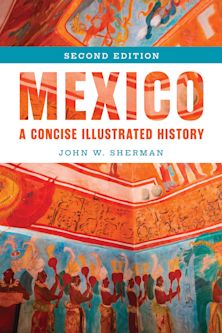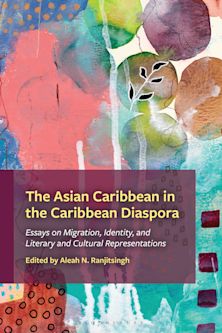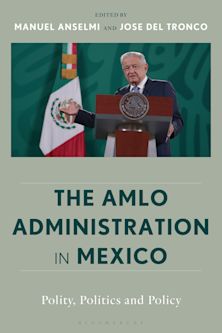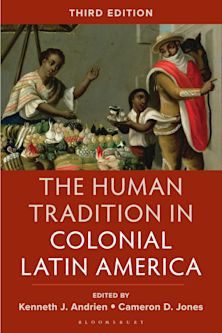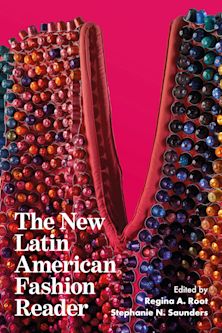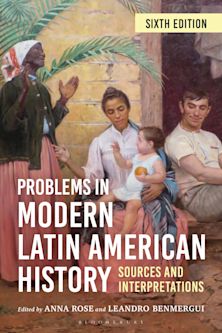The Women's Revolution in Mexico, 1910-1953
Stephanie Mitchell (Anthology Editor) , Patience A. Schell (Anthology Editor) , Katherine Elaine Bliss (Contributor) , Sarah A. Buck (Contributor) , Stephanie E. Mitchell (Contributor) , Carmen Ramos Escandón (Contributor) ,
- Textbook
The Women's Revolution in Mexico, 1910-1953
Stephanie Mitchell (Anthology Editor) , Patience A. Schell (Anthology Editor) , Katherine Elaine Bliss (Contributor) , Sarah A. Buck (Contributor) , Stephanie E. Mitchell (Contributor) , Carmen Ramos Escandón (Contributor) ,
- Textbook
This product is usually dispatched within 3 days
- Delivery and returns info
-
Free CA delivery on orders $40 or over
Description
This book reinvigorates the debate on the Mexican Revolution, exploring what this pivotal event meant to women. The contributors offer a fresh look at women's participation in their homes and workplaces and through politics and community activism. They show how women of diverse backgrounds with differing goals were actively involved, first in military roles during the violent early phase of civil war, and later in the state-building process. Drawing on a variety of perspectives, the volume illuminates the ways women variously accepted, contested, used, and manipulated the revolutionary project in Mexico.
All too often, attention has been limited to elite, pro-revolutionary women's formal political activities, particularly their pursuit of suffrage. This timely volume broadens traditional perspectives, drawing on new scholarship that considers grassroots participation in institution building and the contested nature of the revolutionary process. Recovering narratives that have been virtually written out of the historical record, this book brings us a rich and complex array of women's experiences in the revolutionary and post-revolutionary era in Mexico.
Table of Contents
Part 2 Chapter 1: The Faces of Rebellion: From Revolutionaries to Veterans in Nationalist Mexico
Chapter 3 Primary document: Letter Regarding the Political-Revolutionary Activities of Señora Guadalupe Narvaez Bautista
Part 4 Chapter 2: Educating the Mothers of the Nation: The Project of Revolutionary Education in Yucatán
Chapter 5 Primary document: A report from the Chief of the Revolutionary Office of Information and Propaganda (1915)
Part 6 Chapter 3: Challenging Legal and Gender Constraints: Sofía Villa's Criticism of Family Legislation, 1917-1927
Chapter 7 Primary document: An Extract from Sofia Villa de Buentello's La mujer y la ley
Part 8 Chapter 4: The Meaning of the Women's Vote in Mexico: 1917-1953
Chapter 9 Primary document: A Letter From Margarita Robles de Mendoza to Plutarco Elías Calles
Part 10 Chapter 5: Of the Sublime Mission of Mothers of Families: The Union of Mexican Catholic Ladies in Revolutionary Mexico
Chapter 11 Primary document: On the High and Sublime Mission of Mothers of Families
Part 12 Chapter 6: Theatre of Operations: Reform Politics and the Battle for Prostitutes' Redemption at Revolutionary Mexico City's Syphilis Hospital
Chapter 13 Primary document: Hospital Morelos
Part 14 Chapter 7: "The Proletarian Women Will Make the Social Revolution:" Female Participation in the Veracruz Rent Strike, 1922-1927
Chapter 15 Primary document: Excerpts from, "I, Woman in the Ideal"
Part 16 Chapter 8: Por la liberación de la mujer: Women and the Anti-Alcohol Campaign
Chapter 17 Primary document: Letter from Antialcohol and Anticlerical Commottee of Nahuatzen, Michoacán to President Lázaro Cárdenas
Part 18 Chapter 9: Improving Mothers: Poverty, the Family, and "Modern" Social Assistance in Mexico, 1937-1950
Chapter 19 Primary document: Call to the Women of México
Part 20 Conclusion
Product details
| Published | Dec 12 2006 |
|---|---|
| Format | Paperback |
| Edition | 1st |
| Extent | 244 |
| ISBN | 9780742537316 |
| Imprint | Rowman & Littlefield |
| Dimensions | 228 x 154 mm |
| Series | Latin American Silhouettes |
| Publisher | Bloomsbury Publishing |
Reviews

ONLINE RESOURCES
Bloomsbury Collections
This book is available on Bloomsbury Collections where your library has access.












